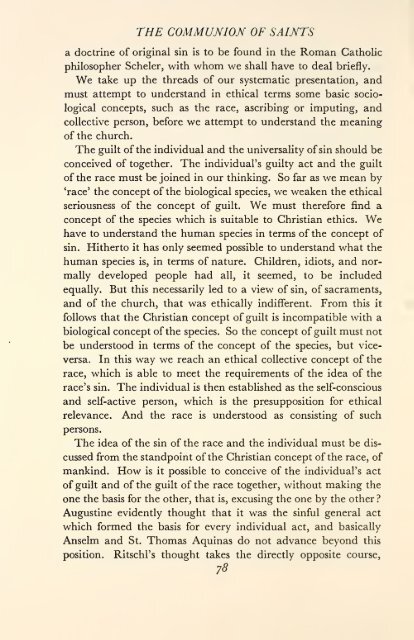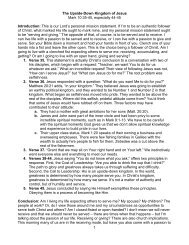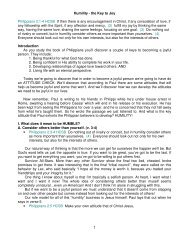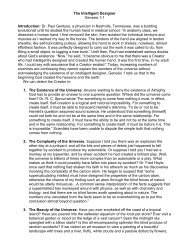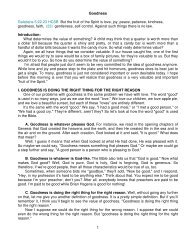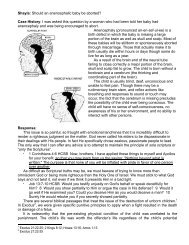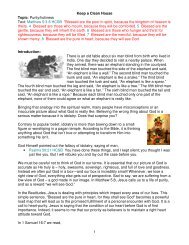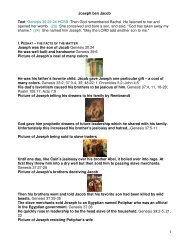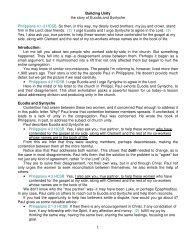Communion of saints
Communion of saints
Communion of saints
Create successful ePaper yourself
Turn your PDF publications into a flip-book with our unique Google optimized e-Paper software.
THE COMMUNION OF SAINTS<br />
a doctrine <strong>of</strong> original sin is to be found in the Roman Catholic<br />
philosopher Scheler, with whom we shall have to deal briefly.<br />
and<br />
We take up the threads <strong>of</strong> our systematic presentation,<br />
must attempt to understand in ethical terms some basic sociological<br />
concepts, such as the race, ascribing or imputing, and<br />
collective person, before we attempt to understand the meaning<br />
<strong>of</strong> the church.<br />
The guilt <strong>of</strong> the individual and the universality <strong>of</strong> sin should be<br />
conceived <strong>of</strong> together. The individual's guilty act and the guilt<br />
<strong>of</strong> the race must be joined in our thinking.<br />
So far as we mean by<br />
'race' the concept <strong>of</strong> the biological species, we weaken the ethical<br />
seriousness <strong>of</strong> the concept <strong>of</strong> guilt. We must therefore find a<br />
concept <strong>of</strong> the species which is suitable to Christian ethics. We<br />
have to understand the human species in terms <strong>of</strong> the concept <strong>of</strong><br />
sin. Hitherto it has only seemed possible to understand what the<br />
human species is, in terms <strong>of</strong> nature. Children, idiots, and normally<br />
developed people had all, it seemed, to be included<br />
equally. But this necessarily led to a view <strong>of</strong> sin, <strong>of</strong> sacraments,<br />
and <strong>of</strong> the church, that was ethically indifferent. From this it<br />
follows that the Christian concept <strong>of</strong> guilt is incompatible with a<br />
biological concept <strong>of</strong> the species.<br />
So the concept <strong>of</strong> guilt must not<br />
be understood in terms <strong>of</strong> the concept <strong>of</strong> the species,<br />
but viceversa.<br />
In this way we reach an ethical collective concept <strong>of</strong> the<br />
race, which is able to meet the requirements <strong>of</strong> the idea <strong>of</strong> the<br />
race's sin. The individual is then established as the self-conscious<br />
and self-active person, which is the presupposition for ethical<br />
relevance. And the race is understood as consisting <strong>of</strong> such<br />
persons.<br />
The idea <strong>of</strong> the sin <strong>of</strong> the race and the individual must be discussed<br />
from the standpoint <strong>of</strong> the Christian concept <strong>of</strong> the race, <strong>of</strong><br />
mankind. How is it possible to conceive <strong>of</strong> the individual's act<br />
<strong>of</strong> guilt and <strong>of</strong> the guilt <strong>of</strong> the race together, without making the<br />
one the basis for the other, that is, excusing the one by the other <br />
Augustine evidently thought that it was the sinful general act<br />
which formed the basis for every individual act, and basically<br />
Anselm and St. Thomas Aquinas do not advance beyond this<br />
position. Ritschl's thought takes the directly opposite course,<br />
78


